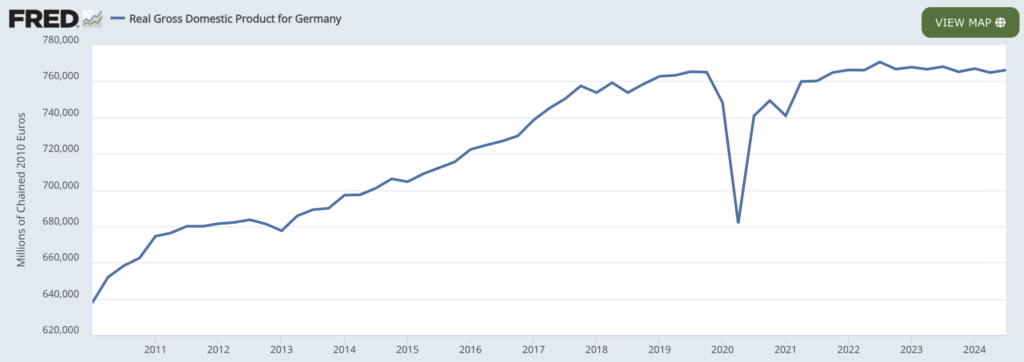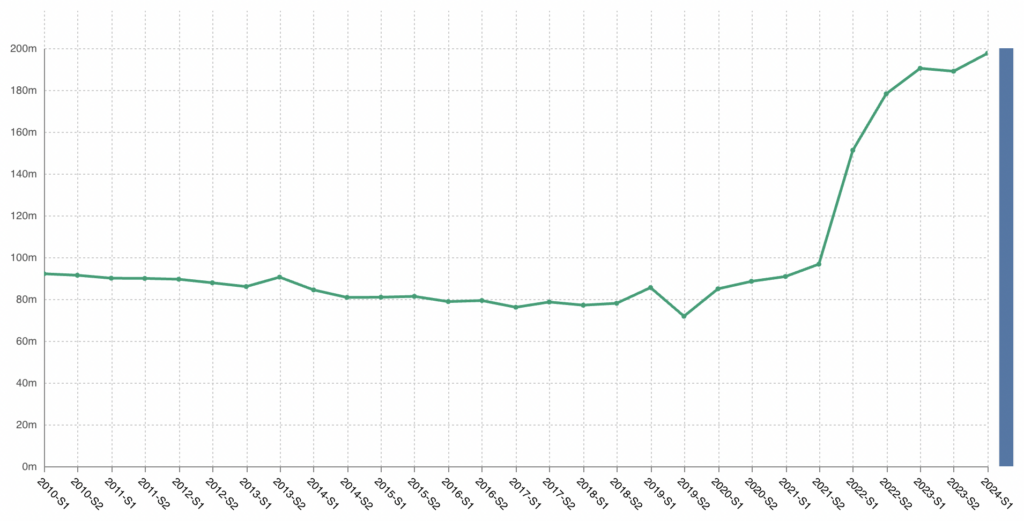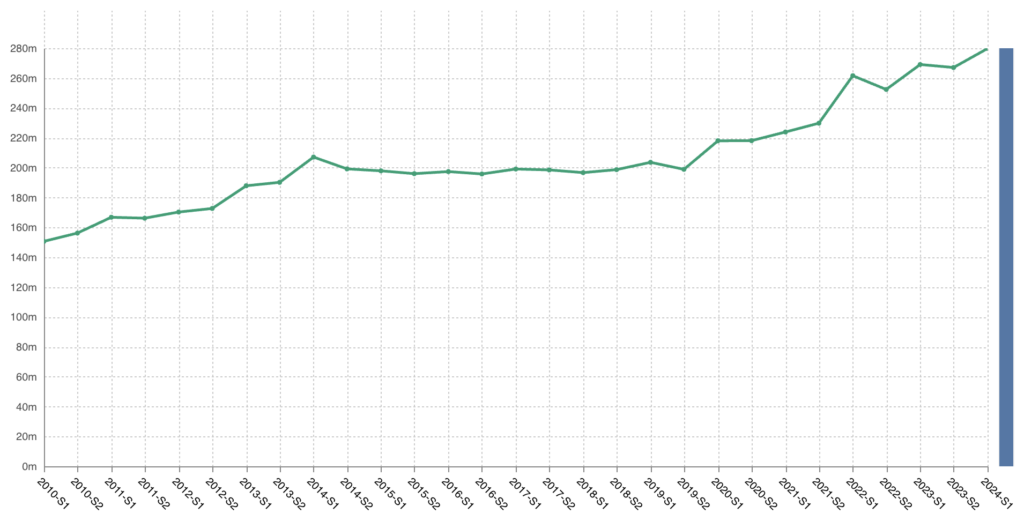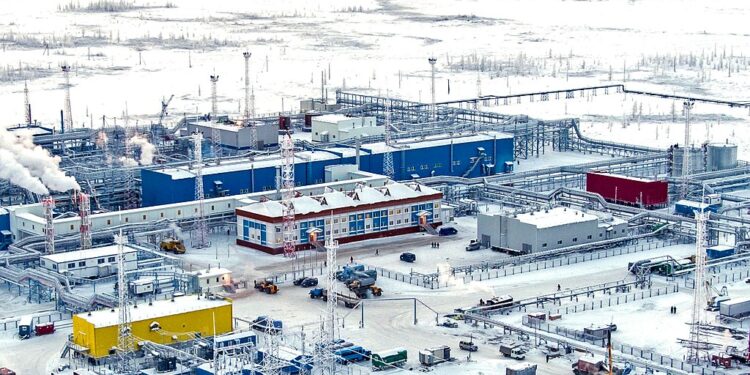The German economy is in crisis. Plants and factories are shuttering. Industrial production is down. And overall GDP hasn’t risen since 2019. According to Andreas Rüter, a corporate consultant interviewed by the Financial Times, the present crisis is of a “completely different order of magnitude” from the dotcom bust, September 11, the financial crisis, the euro crisis and the Covid pandemic.

In the latest piece of bad news, the car manufacturing giant Volkswagen announced that it may have to shut down several German factories for the first time in its 87-year history.
Everyone agrees that a major cause of Germany’s economic troubles is high energy costs. Indeed, the price that industry pays for electricity is about three times higher in Germany than in the US. But why have energy costs risen?
Many people on social media blame the Energiewende (Energy Transition), a policy that involves expanding solar, wind and hydroelectric power, while phasing out the country’s remaining nuclear plants.
There can be little doubt that energy costs would be lower in the absence of the Energy Transition. However, it can’t explain why the economy is suddenly in so much trouble. The Energy Transition was formally announced in 2010 and has been implemented in various stages since then. Yet as the chart above shows, Germany enjoyed robust growth between 2010 and 2019. In fact, industrial production reached an all-time high as recently as 2018.
A related claim is that energy costs have soared because of the decision to close three nuclear plants in April of 2023. But this doesn’t fit the facts either. The chart below shows the price of electricity for non-household users in band IC from the first half of 2010 to the first half of 2024. As you can see, practically all of the increase happened before the three nuclear plants were closed. (Charts for other consumption bands tell a similar story.)

Indeed, most countries in Europe saw a sharp rise in energy costs at exactly the same time, including France, which relies heavily on nuclear power.
The chart below plots the same quantity as above but with taxes and levies included. Here the increase is much less steep, which suggests that fiscal policy has actually been making energy cheaper over the last few years, relative to the period before the increase.

The main reason energy costs have soared is that Germany is no longer buying large quantities of cheap Russian gas. Indeed, practically all of the increase happened between the first half of 2022 and the first half of 2023 – the exact period in which the price of gas spiked owing to the drastic reduction in Russian gas flows. (Europe still gets about 20% of its gas imports from Russia, as compared to 45% before the war.)
In the medium-term, there are things Germany can do to bring down energy costs, like building more LNG terminals, reversing its phase out of nuclear power and shifting to less energy-intensive industries. But in the short-term, there’s nothing it can do to replace large quantities of cheap Russian gas. So the country’s economic troubles will continue for the foreseeable future.
An earlier version of this article stated that Europe gets about 20% of its gas from Russia. This has been corrected.














To join in with the discussion please make a donation to The Daily Sceptic.
Profanity and abuse will be removed and may lead to a permanent ban.
Pretty demoralising walking up the high street earlier seeing the sheer numbers of people still wearing masks. Mind, the average age around here is about 80. Bloody coffin dodgers.
Just been to local Tesco express for wine supplies all staff maskless and only 1 old lady masked up
The difference between Waitrose at one end and Lidl at the other is stark. Apart from the class dimension, black people are also more prone to call bullshit on the masks. Good for them.
Yep, at our A Stand In The Park yesterday two passing ladies asked what our group was about. They were also very sceptical and asked questions. It was great chatting with them.
Poor old dear probably believes that wearing a loose bit of cloth is actually protecting her.
I’ve actually got more respect for the folk wearing N95 / FFP2 / FFP3 valved respirators: their fear may be irrational, but at least they’re doing something less futile about it.
Couldn’t agree more.
From a 72 year old.
In my town yesterday I was shocked to see so many naked faces! I hadn’t been in for a while. Even in the shops it was about 50:50. A couple of weeks ago it was near on full compliance! The old ones though are still shuffling around, wheezing in the heat behind their naps.
Fascinating to hear of the changes in different places.
Last week about 50% muzzled in the farm shop and 80% in the Co-Op. This week 80% in the farm shop and 90% in the Co-Op. WHY???
In Aldi 80% unmasked compared to 80% masked in Asda!
‘Bloody coffin dodgers.‘
Not if they’ve had their jabs.
Good for all who abandon masks.
A year ago, I cut off a former friend, aged in his mid 20s, who announced on Facebook he was saving lives by wearing a mask.
I don’t need that kind of subservience in my life, I can imagine the idiot regurgitating Pravda as if it were fact, if he were in Russia.
And saying grateful prayers to Papa Stalin.
Stalin has ensured abundance and I have faith in Trofim Lysenko…..
reminds me of the headline about the person who wrote post soviet Russia’s new national anthem – “for God and for Stalin”.
Yes – I now have zero tolerance for such twits.
You’ve misspelt twats.
As I mentioned in a comment yesterday while out shopping in my area of SE London nearly everyone was still masked up and the few that weren’t were mostly the over 40s.
Where are you more precisely? That’s my neck of the woods (Penge very roughly – don’t want to tell CCHQ where I live)
the places I visited were around the Orpington area.
Figures
I imagine Bromley would be even worse.
Is fat Pat still working in Penge giving assisted showers?.Don’t worry I’m in Caldicot come and get me you Cunts!
You’ll be on the list. We all are.
They know anyway.
My observation is that it’s older and uglier people who keep the masks on. The younger, good looking ones seem to be more ready to take them off.
Yup. About 95% masked up in shops in SW London, across all age brackets. A significant number still wear masks out on the streets. Bunch of retards. Only me and an oriental lady didn’t wear one when paying at a petrol station.
Out and about in a shabby area of North London yesterday the compliance was patchy – some places quite high, some quite low, guite a few people on buses bare faced. I didn’t notice any great difference regarding age bands – plenty of youngsters with masks and plenty of middle aged people without.
It’s not compliance any more, it’s fashion.
virtue signalling at its most obvious
Finally the perennially petrified are on the back foot and in retreat.
Now let’s drive them back and complete the rout.
Victory to the free.
https://medicalxpress.com/news/2021-07-covid-mrna-vaccine-dose-safe.html
Idiots use this to say second dose “safe” rather the more obvious is first dose safe?
Thanks. Hopeful.
In the US, over at FauxNews one of the pieces reads ‘why are teens not getting vaccinated’. Sigh.
https://babylonbee.com/news/car-manufacturers-now-recommend-wearing-a-seatbelt-even-when-youre-outside-the-car
It is fitting that the word for “mask” in Latin is ”larva” or “ghost”.
“a blanket or a false face, with which the face is disguised”
Richard Weihe: The paradox of the mask: history of a form
The word “larva” also denotes the disguise of a person who wants to hide his evil plans.
The psychopaths decreed the public should wear masks to conceal their empathy for their fellows, just as these spooks wear masks behind masks to conceal their lack of empathy.
https://bakerstreetrising.home.blog/2021/07/15/covax-through-the-looking-glass-part-7/
‘Persona’ also means mask. Hence ‘Dramatis personae’, because all actors in ancient drama wore masks.
Take off a zombie’s mask and you are left with a non-person.
Yesterday I sat in car while hubby went into Argos. Depressing to see how many people walking about in masks. Then short shop in Boots , probably 50%.
Have recently been going to my local Stand in the Park. Good to be with like minded people, highlight of my week!
( hubby is not a sceptic!).
I don’t get it. If people want to wear masks – what’s wrong with that?
It’s based on a Lie – a key Lie in the set of Lies that make up the Big Lie. The Lie is that the masks make you safer, amd make others safer, and that there is something significant to be made safe from.
And most places are still bullying their customers and/or staff into wearing them, so any activity involves you have to battle with signs, dirty looks and harrassment from other customers and staff. You can’t fly without them.
If you want to wear one for the rest of your life, knock yourself out, but don’t ask me to wear one, and be under no illusion that by wearing one you are in some small way collaborating with the Big Lie which has done immense damage to human civilisation.
They are still mandatory in parts of the UK, and on TFL, and in may other countries, and will come back to being mandatory here sooner or later.
I agree on one point, MTF: you don’t get it.
Quoting an “early adopter” from last year before the mandate: “I always wear a mask outside to remind people that there’s a pandemic going”.
In principle, there’s nothing wrong with that. However, if somebody thinks that he must “remind” me that certain people in this country are responsible for prohibiting me from meeting my parents for two years in a row (and a host of other things), my reaction to that might not always be positive (to say the least).
“In principle, there’s nothing wrong with that.” Well, maybe if there was a pandemic. But if there was a pandemic, people wouldn’t need reminding.
I was being sarcastic, IOW, while people technically have a right to do this, I think there’s something very wrong with this kind of behaviour. Sort of the well-known “consequences of your choice” in reverse :->.
Eg, today, when some masked Chinese guy aproached me in order to “sale” something to me, I ended up yelling “Hau bloß ab mit Deinem Gesichtslappen!” at him.
Indeed. It’ll be a clear sign we’re out of the woods when we see them becoming rare. I’m not holding my breath.
If they have their booster plus flu jab they’ll all become rare.
Surely you’ve seen the piles of corpses in the street? I cannot get to the shops because my arthritis prevents me from clambering over them. It’s dreadful, and the only thing keeping me alive is a mask with more holes in it than a tea bag. Take your blinkers off man! You’ll be advocating freedom of choice next and freedom of movement, freedom of action, freedom of speech and goodness only knows what other terrifying freedoms. Can’t you see that those who are terrified of freedom need to be protected from the dangers posed by those who aren’t and are willing to accept that life is a dangerous business?
Now where are my dummy, blankie and teddy. I think I’ll hide under the bed; I’ll be safe there.
Does he also wear a tin hat to remind people that meteorites land on Earth now and then?
What’s wrong is that so many of them really don’t want to, but have succumbed to heavy pressure from the Govt and supermarkets to wear them. I know this from talking to friends and relations. I’m fine with those who really want to wear them wearing them – always have been!
I’m not fine with people wearing them in so far as it’s part of the terrible state that they have been driven to by the evil loonies in charge. I’m not proposing strict prohibition, but I think that part of the healing process from this madness has to involve an official campaign to tell people that masks are useless. It won’t happen in my lifetime.
Germany bans certain symbols due to their association. Ataturk banned headscarves and the fez, I believe.
It shows how weak-minded, incurious and unquestioning they are.
Anyone who thinks it’s a good idea to block the respiratory pathway for prolonged periods, for no sensible reason, deserves all he/she gets.
Yeah whats wrong with it?
There is nothing wrong with it; it’s just saddening to see so many people who are clearly incapable of thinking for themselves and are prepared to do precisely as they are told even when doing so is clearly not in their best interests.
I would guesstimate at about 20% varying ages, still wearing masks in my neck of the woods up north.
What I have found refreshing is seeing people smiling, more eye contact and generally more upbeat.
What a difference.
“What a difference.”
Agreed and yes, it’s refreshing but if we all went around grinning at everybody that would be like living in Butlins!
Something I observed while out yesterday was the number of (unmasked) faces we don’t smile at or demonstrably acknowledge but are subliminally aware of. I’d suspected the hidden importance of this when masks were first imposed and refused to wear one partly for this reason. Every being made faceless in public is one speck of humanity visually erased.
Mostly middle-class comfortable paid to stay at Home types and those with Schizophrenia still Champion the face tampon.
I absolutely loathe those people who are still wearing masks – especially the ones wearing them outside in the open air – I sympathised with them to begin with last year (the government propaganda was evil and endless) – but that sympathy dissolved early this year when Boris kept pushing back the dates of lifting restrictions and people still kept wearing the masks – but now restrictions are lifted and I simply don’t see any reason to wear them anymore and so now I loathe all mask wearers with a passion – some were nervous nellies to begin with but I think most are just virtue-signalling wankers who simply crave attention.
The worst are masked mothers that are hiding their faces from their babies – proper brain development depend on facial expressions
Absolutey spot on Victoria – completely agree with you.
I don’t get the ones who wear their masks under their noses. Previously, I thought it was their way of rebelling but to still be doing it makes no sense.
Hope the young fight back for their liberty, before Johnson decides that they all need to forced to be jabbed to go to Uni. The man who said he would eat his ID if asked to show it.
Walked into the bank today, without a mask, and smiled at the first person I saw. A young man, not much older than myself, thanked me for smiling at him. Said it was the first time a stranger had smiled at him in a long time.
I was in Cambridge over the weekend, I expected it to be Maskville, but hardly any to be seen. A few young women, a few elderly militant academic types in the main were the wearers. This surprised me as masks were big there even in May/June 2020 before they were enforced in shops under colour of law.
Update from small market town in Dorset. Waitrose, getting there! Early this morning probably around 30% unmasked, most of whom were 50+. Independent butcher, all staff had dispensed with masks and there was no sign asking customers to mask up. Said well done to them. Independent greengrocer, staff unmasked, one customer masked. Still a lot of masking up out in the fresh air, wearing under the chin etc.
Yes, some of Waitrose staff (Waitrose…says something about the demographic doesn’t it? ) in Gillingham and Sherborne were also not wearing their masks. Personally, I have stopped wearing a mask anywhere whether its public transport or shops.
You see burly builders in Morrisons who probably just taken a chimney down with asbestos without a mask…but there they are in their filthy masks in store. One guy walking along the high street masked up…took it off for a moment to have a drag on a fag…you couldn’t make it up…
Did he exhale with the mask on? It would have been an interesting site just like “The Swiss Doctor’s” video!
Good on the Pommy youngsters. Here in lockdowned and mandatory-masking, ‘Zero Covid’ South Australia, mask compliance is close to 100%, including amongst the young. Terrify and infantilise people and they will obey with unthinking zeal. Think I’ll move to Blighty!
Better get here whilst it lasts. You’ve probably got 4-6 weeks max.
Still depressing that so many are wearing them at all. I was in a coffee shop in a cotswold town near Cheltenham yesterday I was the only person not wearing a mask. People were still queuing outside some shops. Its like they are caged animals who even thought the cage door has been left slightly ajar still remain in the safety of their cage. I think these people are now in collusion with the Government to ensure life never returns to anything like normal, after all we have reached the end of Johnsons roadmap, and to me it looks like we are in the same place that we started from,
That is depressing- people heroically wearing their muzzles to do their ‘bit’, completely unaware of the lurking threat to their freedoms longterm.
YouGov polls are automatically skewed so when you say for instance that you are not in favour of masks, it diverts your answers to all who are not in favour of masks and those in favour of masks are diverted likewise. YouGov polls are nonsense. None of their findings make sense and the results can be spun anyway you like.
That’s why I stopped taking part in them.
Me also.
Agreed. I just filled one in about youngsters not taking “the jab”. You can never answer the question the way you want as they assume you are a fully paid up member of the experimental gene therapy movement even though you’ve just told them you think the Government is doing a terrible job rolling out “vaccines” (hate using that word). They assume you’ve said they are doing a bad job because you agree with the whole horror show when of course the opposite is true but they don’t want that to come through. It’s devious, deceptive and criminal really.
Seems to be only a slight change in mask wearing here now and a few have returned to them again. In some places I still am the only person without a mask . More men unmasked than women, including a bus driver but no particular age group more than others. It makes me absolutely furious that the majority of people will let the Media/BBC et. al. tell them how to live their lives. Brainless imbeciles.
. More men unmasked than women, including a bus driver but no particular age group more than others. It makes me absolutely furious that the majority of people will let the Media/BBC et. al. tell them how to live their lives. Brainless imbeciles.
I smiled at a lady without her mask, lovely to see someone else with an independent mind.
‘Young People Are Abandoning Masks‘
BIG BLUBBER raging. Isn’t this ripe for one of those Downfall parodies?
‘Mein Fuhrer … Mein Fuhrer … Der Virus ist Todt‘?